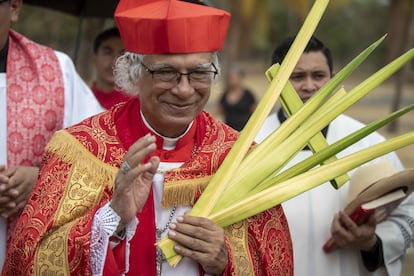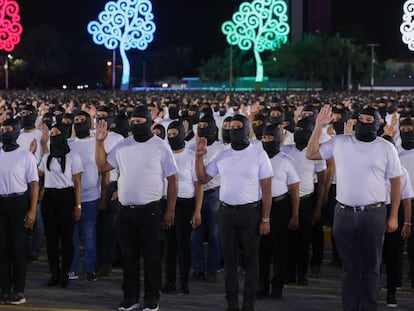No freedom of movement, supervised sermons and no prayers for Nicaragua: How the Ortega-Murillo regime controls its priests
A report by the religious organization CSW reveals that the Sandinista government has deployed undercover police at masses


During Lent and on the eve of Holy Week, one of Catholicism’s highest celebrations, Father Fabricio feels “emasculated.” He has received direct warnings from Daniel Ortega and Rosario Murillo’s police forces, which he “knows,” he tells EL PAÍS, he cannot ignore; doing so would mean jail or exile: “They told me not to hold processions of the Stations of the Cross on Fridays, to moderate what I say from the pulpit, and not to go around praying for the good of the country, because the country is doing very well with the comandante and his compañera,” says the parish priest, who requests anonymity and to conceal the location in Nicaragua where he provides his pastoral services for fear of reprisals.
Father Fabricio says he doesn’t fear the prison or exile that other priests like him have suffered. But he has chosen to “moderate,” because the parishioners “are left orphaned and helpless” when a priest falls into the clutches of the government. “To obey force is horrible, because we are shepherds, as Pope Francis says; shepherds who are devoted to the suffering flock of God. In this time of Lent, of the Passion and Resurrection of our Lord Jesus Christ, one feels emasculated. Observed when one says Mass, because we know there are cell phones recording what we say,” says the parish priest.
Father Fabricio’s fears are supported by the facts: in November 2024, the bishop of Jinotega and president of the Nicaraguan Episcopal Conference, Carlos Enrique Herrera, was arrested and taken to Augusto C. Sandino International Airport in Managua, from where he was exiled to Guatemala. This happened two days after the prelate criticized Sandinista mayor Leónidas Centeno in his sermon for organizing a recurrent and boisterous partisan rally that often interrupted Masses at Jinotega Cathedral.
This harassment of the Catholic Church was recognized by a United Nations Group of Experts (which classified it as a crime against humanity), and now a report by Christian Solidarity Worldwide (CSW) reveals for the first time the imposition of de facto “precautionary measures” by the Sandinista police against religious leaders, especially Catholic priests. CSW recorded 222 cases of violations of freedom of religion or belief during the period studied.
“On Tuesday, August 27, 2024, police officers led by Captain Wilber Montenegro Martínez arrived at the rectory of Our Lady of Fatima Parish, where they questioned and photographed Father Luis Eduardo Benavídes,” the organization said. “The priest was informed that, from now on, the police would visit him every Tuesday to interview and photograph him, and that he was not allowed to leave the municipality without police authorization. The priest fled to Honduras in the early hours of the following day.”
Throughout 2024, CSW received nine additional reports of priests subjected to these measures. However, Father Fabricio asserts that there are more. “What happens is that everyone lives in fear and doesn’t speak out. For example, I didn’t speak to that organization about the report that mentions me, but I was warned by officials,” he says.
In each of the nine cases collected by CSW, the priests were detained and interrogated. They were assigned a specific local police officer and ordered to report to the officer weekly. “They were also subjected to restrictions on their freedom of movement, prohibiting them from leaving their municipality without prior permission from the authorities. Some reported being warned that if they did not comply with the precautionary measures, they would be detained or exiled,” the report highlights.
Supervised Masses
In 2024, CSW recorded 46 cases of arrests of religious leaders. Some were released within hours, but others “remain detained in inhumane conditions.” One of them is Father Frutos Constantino Valle Salmerón, 79. He is under house arrest at the Our Lady of Fátima National Interdiocesan Seminary. “We feel alone because the Cardinal [Leopoldo Brenes] doesn’t say anything. It’s as if they have silenced him,” Father Fabricio complains.
“Religious communities and individuals continued to report threats and harassment by government officials or their representatives, in the form of pro-government activists and paramilitaries,” the CSW report continues. “Both Protestants and Roman Catholics frequently reported the infiltration and use of informants in congregations of all types to monitor and report on the content of sermons, prayers, and other activities, indicating that the government views religious or belief communities with increasing suspicion and actively and systematically monitors them.”
This surveillance is not isolated. It is part of a network of total surveillance and control designed by the presidential couple to impose a totalitarian all-seeing eye at all levels of society, a group of United Nations experts recently denounced.
“On May 7 of last year, the police closed the Shrine of Our Lady of Cuapa and blocked access to the faithful who came from all over the country. It will be the same this Easter, with the Nazarenes using a church as a prison and us, as pastors, emasculated. Now add the issue of taxes,” Father Fabricio criticized, referring to official attempts to financially strangle the Catholic Church by eliminating historic tax exemptions. In 2024, the exoneration of real estate tax to religious institutions was revoked, forcing them to pay high amounts for their properties and places of worship. In addition, the prelates have denounced that the Ministry of Finance has begun to audit and tax all donations received by churches, including those destined for social work.
Sign up for our weekly newsletter to get more English-language news coverage from EL PAÍS USA Edition
Tu suscripción se está usando en otro dispositivo
¿Quieres añadir otro usuario a tu suscripción?
Si continúas leyendo en este dispositivo, no se podrá leer en el otro.
FlechaTu suscripción se está usando en otro dispositivo y solo puedes acceder a EL PAÍS desde un dispositivo a la vez.
Si quieres compartir tu cuenta, cambia tu suscripción a la modalidad Premium, así podrás añadir otro usuario. Cada uno accederá con su propia cuenta de email, lo que os permitirá personalizar vuestra experiencia en EL PAÍS.
¿Tienes una suscripción de empresa? Accede aquí para contratar más cuentas.
En el caso de no saber quién está usando tu cuenta, te recomendamos cambiar tu contraseña aquí.
Si decides continuar compartiendo tu cuenta, este mensaje se mostrará en tu dispositivo y en el de la otra persona que está usando tu cuenta de forma indefinida, afectando a tu experiencia de lectura. Puedes consultar aquí los términos y condiciones de la suscripción digital.

